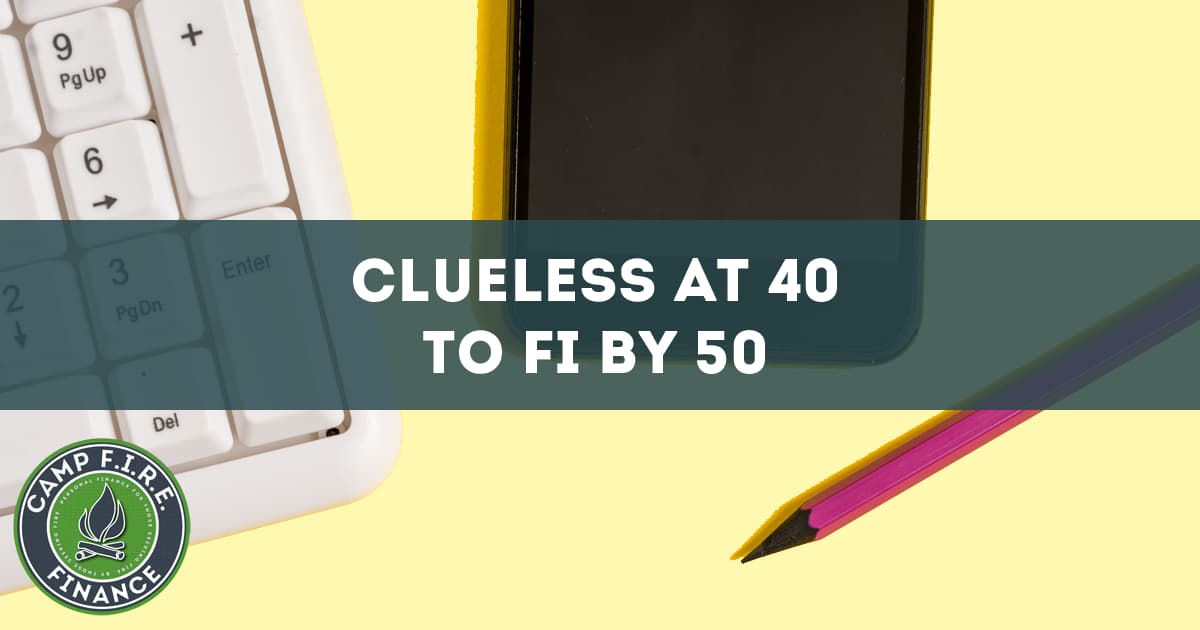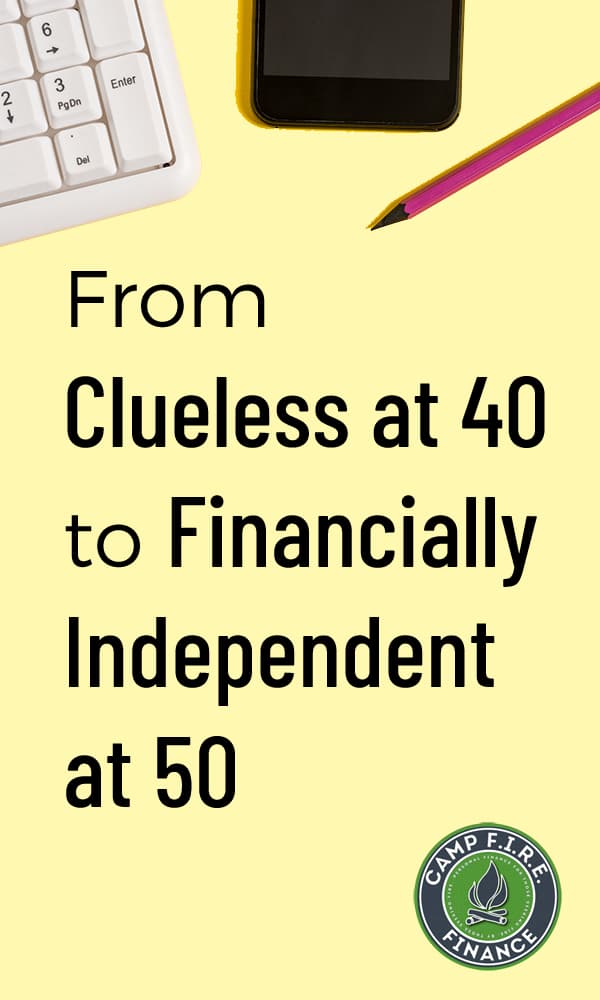
Clueless at 40 to Financially Independent by 50
 Can you go from clueless at 40 to financially independent in less than 10 years? We are. And, we’ll do it as two public educators, not doctors or investment bankers.
Can you go from clueless at 40 to financially independent in less than 10 years? We are. And, we’ll do it as two public educators, not doctors or investment bankers.
We aren’t quite there yet, but here’s how we’ve turned things around and why I’m confident we’ll get there.
If you’ve just started paying attention to your finances in your 30s, 40s, or even 50s it’s not too late. No doubt your situation is different, but you’re aware now and that matters. Ours is just one story – you can write your own!
Our First Twenty Years
We Started Out Broke
We started out as two new teachers, more than $100,000 in debt thanks to student loans and consumer debt from our college years. We then bought a house on a zero down mortgage and jumped into our careers. Living the American dream!
Fortunately, we did two things right early. We worked on growing our income through education and side hustles. We used it to eliminate debt (except the mortgage) in our 20s.
Then, we stopped paying attention. Rather than saving or investing, we spent every penny we earned.
New cars, bigger house, increasingly expensive vacations. Our lifestyle grew with our income and we never even considered that there might be another way.
40 and Still Clueless
We found ourselves at 40, almost two decades into our careers, with very little to show for it. We simply weren’t thinking about our financial future. Our net worth was $0.
Ironically, it was one last glorious lifestyle inflation mistake that started our turnaround. We decided to buy a vacation home. Yes – no retirement savings and we chose to make another major purchase. Clueless!
For more than a year, we carved out savings for a down payment. As soon as we found a property, we pulled the trigger. We now had a second mortgage.
Three months later, after a particularly tough stretch at work, I had an epiphany. The way we were living meant we’d be working forever. Even if we loved our jobs now, that might not always be true. Yet, we’d have no option but to keep earning. We were trapped.
That period of saving quickly for a down payment had taught us one thing – we had a lot of room to reduce spending and save if we were intentional with our money.
Our turnaround started.
How We’ve Turned It Around
How did we go from no financial plan to soon-to-be financially independent in less than 10 years? Here are the things that mattered most:
Educating Ourselves
Like many professions, teachers don’t talk much about personal finance. Our families weren’t good sources of information, and our social groups never talked about money.
Fortunately, there is a lot of great information out there – for free! I dived into several books and then discovered the online personal finance community. Suddenly, a wealth of resources and information opened up.
Now we knew what was possible. As GI Joe used to say (there’s a Gen X reference!) – “… and knowing is half the battle!”
We continue to consume personal finance content regularly. This gives us access to new ideas, new approaches, and inspiring stories. Community matters.
Getting On The Same Page
Money is often a source of stress in relationships. It wasn’t for us, because we just avoided talking about money in our marriage. We certainly never set financial goals together.
We’ve changed that.
First, we gathered all of our financial information and looked at what it meant. Then, we talked about how we’d intentionally design our future. The conversation was less about the numbers and more about possibilities.
What would financial freedom mean to us? How quickly would we like to reach it?
What was important to preserve in our current lifestyle? What could we give up?
These conversations can be stressful. Especially at first. Now, I can say having regular financial conversations has made our relationship stronger than ever.
We hold annual goal setting, quarterly goal reviews, and monthly check-ins. We actually look forward to these conversations!
Recognizing Our Advantages
We’d certainly done a number of things wrong. It’s easy to focus on the lost decades of investment, the missed chances for saving, and the purchases you’ve already made.
Just beating yourself up won’t let you turn things around. Nor will focusing only on your disadvantages. Public education isn’t exactly known as a profession where you make a fortune.
We’d done a few things right and it was important to acknowledge those and use them as building blocks.
Though we’d spent far more than we should, we’d never taken on additional debt. This meant that any savings we created could immediately go into saving for the future.
We’d increased our income throughout our careers and always earned extra money. Income and spending are the two sides of the personal finance equation. We are fortunate to live in a community where educators are paid decently, and we’d worked hard to make even more.
Starting out we earned less than $70,000 combined. Now, between base salaries and side hustles we can bring in up to $200,000 a year. That’s a big advantage for a turnaround once you stop spending mindlessly.
The too-large house we’d purchased had appreciated and we had some equity.
Finally, we discovered that educators have some advantages in the pursuit of financial independence.
We acknowledged our mistakes and missed opportunities, but focused on using our advantages for the future. It’s important to build on your strengths.
Making A Plan
We made our first ever financial plan in our early 40s.
It was very rough, but included:
- Tracking our spending for 3 months
- Additional mortgage paydown
- Emergency fund
- Annual investing goal
- A target net worth
After creating that first plan, we saw how we could reach financial independence in twelve years. It was exciting and motivating. We were no longer clueless.
…And Adjusting It
Every year, we revisit and refine that plan. Once we started paying attention, we discovered new savings levers, refined our assumptions, and become more motivated.
Each new iteration of the plan increased our confidence and shaved time off the initial projections. Every year we’ve saved more than the previous year.
As a result of improved planning and higher-than-expected market returns we’ve shaved off almost five years from our initial projections. We’re also better able to weather the inevitable market downturns.
Automating Investments
The biggest key to our financial turnaround was automating our investments. In particular, investment into tax-advantaged accounts.
Our very first year, we maxed out contributions to our 403b accounts (the educator version of a 401k) for the first time ever. That was a total of $36,000 going into retirement accounts. Since it was pre-tax through a payroll deduction it felt like less – our paychecks didn’t shrink as much as we’d anticipated.
Then, we discovered we also had access to 457b options. As we created more gap between our income and spending we increased our contributions. Each year since, we’ve stepped it up.
Now, after five years, we invest almost $100,000 a year in tax-advantaged accounts: 403b, 457b, HSA, and IRA. This year, and every year going forward we’ll max out those options.
Our contributions are all automated and come out before we ever see the money. We adjust contributions and allocations once annually, and remove all choice and temptation for the rest of the year.
Reducing Major Expenses
We learned from those three months of tracking spending that real savings would come from a few major areas. Sure, we could obsess over a few dollars here and there to carve out additional savings. That comes with a high mental cost for very little reward.
Instead, we’ve managed to save over 60% of our income by focusing on the big costs.
Our biggest move was to downsize our home. We sold our too-large house and captured the stored equity.
By going from nearly 3000 square feet to just over 1200, we cut our housing costs in half and improved our quality of life. All it took was getting intentional about what we truly needed in a home.
We still own our vacation home, but operate it as a short-term rental when we aren’t using it. It’s now almost buying itself. It’s not really an investment, but it’s no longer a financial drag.
Travel is one of our biggest expenses and an important part of our life. We’ve learned to travel hack, started taking road trips, and use the vacation home for most getaways. We still enjoy our vacations just as much but spend 80% less!
Our cars are fully paid off and we’ll drive them until they need to be replaced.
Implementing meal prepping and taking lunch to work have reduced our meal expenses.
By focusing on the big expenses, we’ve reversed more than 15 years of lifestyle inflation. Our annual cost-of-living is now what it was 5 years into our career.
Prioritizing Our Finances
For the last five years, our choices have been focused on improving our financial future. It’s become an important part of our relationship and approach to life. This is a remarkable change from our first decades together where we paid zero attention to our money.
As a result, we’ve built a seven figure net worth and will be financially independent before 50.
…without sacrificing the now.
Rather than a sacrifice, we’ve found the change to be empowering. We feel more confident about our careers, optimistic about our future, and aligned in our marriage.
The changes we’ve made bring our lifestyle into alignment with our values. We haven’t given up anything that truly matters. We still live in a comfortable home, travel, and enjoy life.
Focusing on what’s important is the point. Don’t choose misery now for a magical perfect future. That’s a prescription for failure.
That’s Our Story. Now Write Yours.
Personal finance is personal. I don’t pretend what we’ve done is exactly what others should do. We made lots of mistakes, started late, and still have the chance to retire early.
The keys for us were:
- Education
- Alignment in our relationship
- Recognizing our strengths
- Creating a plan then reviewing and adjusting it regularly
- Automating our investments
- Reducing the big expenses
- Prioritizing our finances (without sacrificing the now)
Your challenges and opportunities are different. Your financial desires won’t be the same. You’ll make different choices. As you should.
I encourage you to take advantage of all the great financial content out there. Campfire Finance is a great way to find it!
Find stories that inspire you. Figure out which levers you can pull. Make intentional choices to improve your financial future.
We’ve gone from clueless at 40 to financial freedom before 50. It’s worth it.
